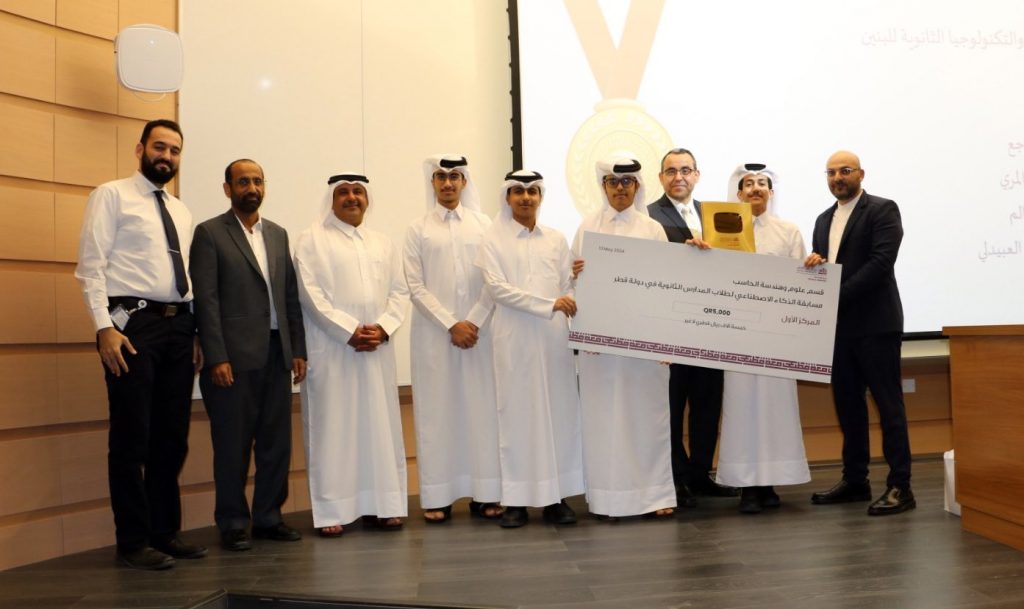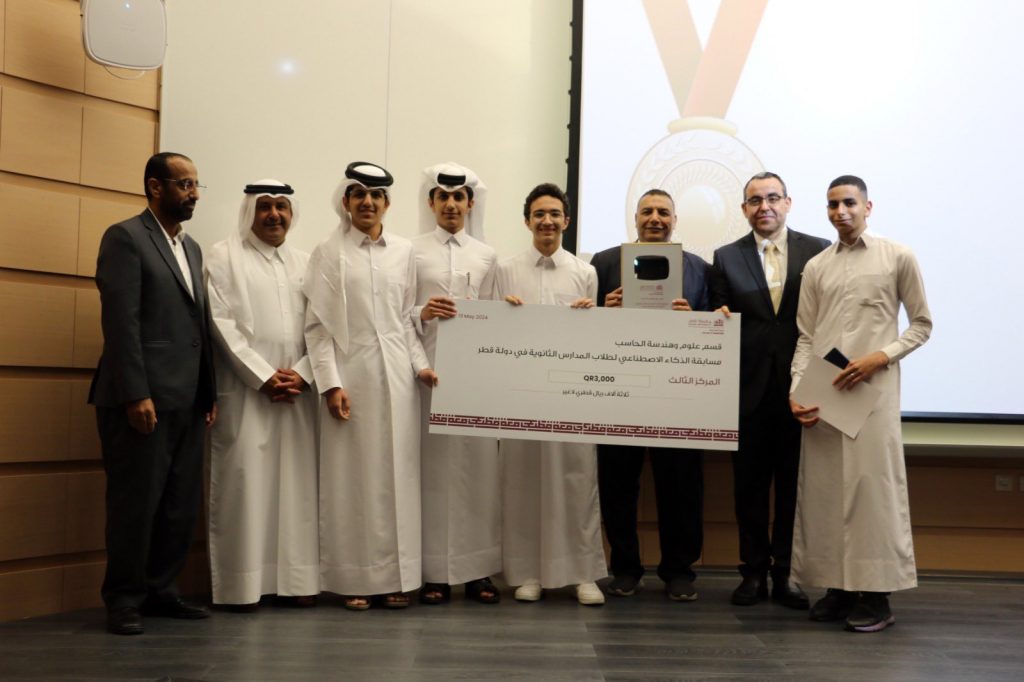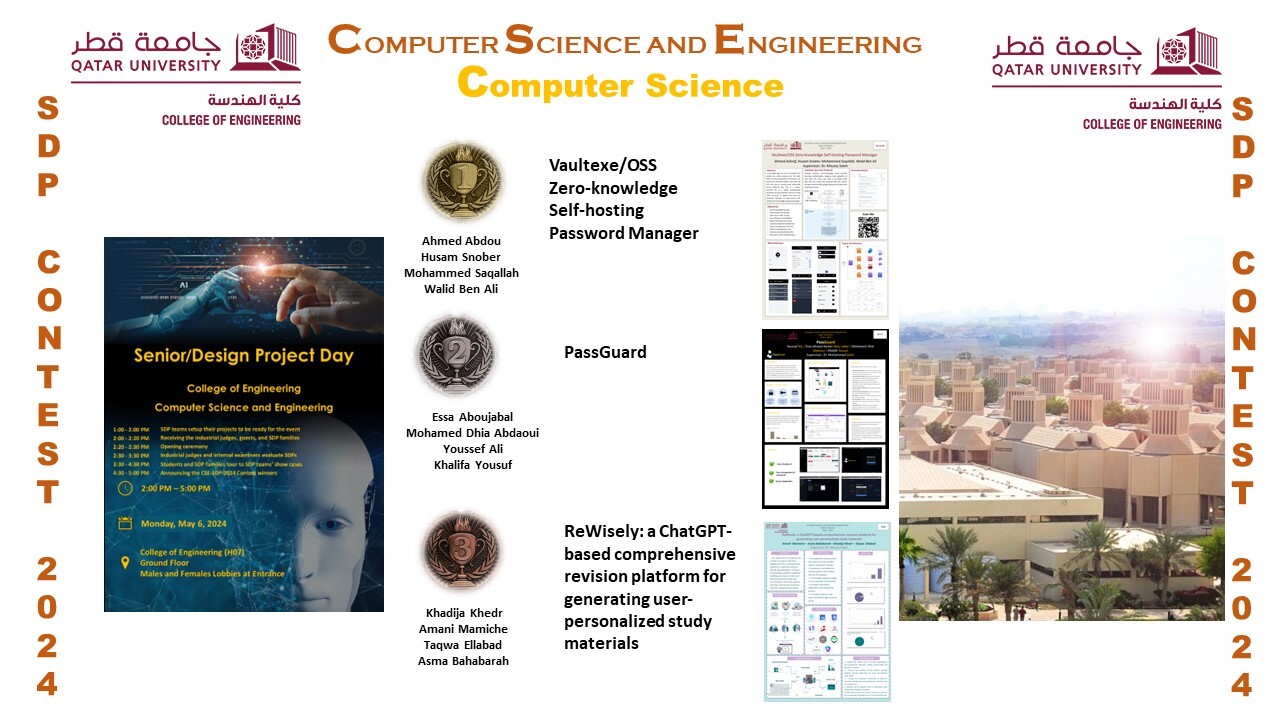Recent Posts
- CSE Students Achieve Top Honors at Huawei ICT Competition 2025–2026 Innovation Track
- Strengthening Industry Collaboration: CSE Hosts IAB Meeting for CS and CE Programs
- CSE Students Secure First Place at Snoonu Hackathon 2026
- CSE Faculties Receive Grants on Institutional Collaboration between Qatar University & Khalifa University
- Computer Engineering Practicum Demo Day & Contest (4th Edition)
Archives
- February 2026
- January 2026
- December 2025
- November 2025
- September 2025
- August 2025
- May 2025
- February 2025
- January 2025
- December 2024
- November 2024
- September 2024
- June 2024
- May 2024
- April 2024
- March 2024
- February 2024
- January 2024
- December 2023
- November 2023
- October 2023
- September 2023
- June 2023
- May 2023
- April 2023
- March 2023
- February 2023
- January 2023
- December 2022
- November 2022
- October 2022
- September 2022
- August 2022
- May 2022
- April 2022
- March 2022
- February 2022
- January 2022
- December 2021
- November 2021
- October 2021
- September 2021
- August 2021
- July 2021
- May 2021
- April 2021
- March 2021
- February 2021
- January 2021
- December 2020
- November 2020
- October 2020
- September 2020
- August 2020
Categories
Project to Enhance ‘Digital Citizenship’ in Qatar
May 29, 2024 / Leave a comment
Dr. Osama Halabi an associate professor in Computer Science and Engineering department is one of the leads of a project titled “Future of Digital Citizenship in Qatar: A Socio-Technical Approach”.
The project is a four-year research initiative done by Msheireb Museums and Hamad Bin Khalifa University (HBKU) as a significant step towards promoting responsible digital citizenship and enhancing positive online community engagement in Qatar.
The project is funded by the Qatar Research, Development, and Innovation Council (QRDI). The initiative comprises six sub-projects led by experts in their respective fields, bringing together more than 60 researchers.
The project’s tangible outputs include web interfaces for public analysis of social media, detection of hate speech, discrimination, and propaganda, as well as training materials and ambassadors to educate students on digital literacy, propaganda detection, safety, well-being, and social inclusion.
Dr. Osama Halabi, highlighted the importance of social media literacy and the project’s focus on assessing public attitudes towards social media in Qatar. The project’s findings, which will be primarily presented in Arabic, are expected to provide deeper insights into the variations between Qatar, the Arab world, and Western countries regarding technology and social media acceptance.
Msheireb Museums and HBKU’s commitment to integrating technology with academia and emphasis on sharing research findings with the public through events, exhibitions, and community engagement activities demonstrate their dedication to fostering a more sustainable and inclusive digital environment in Qatar.
This collaborative effort between academia, museums, and the community is a promising endeavor that has the potential to impact digital citizenship and online community engagement in Qatar significantly. The initiative’s focus on responsible digital citizenship and positive online engagement sets a commendable example for other regions and countries.
QU Wraps Up the 2024 AI Competition for High Schools
May 26, 2024 / Leave a comment

Qatar University (QU)’s College of Engineering has successfully concluded the Artificial Intelligence (AI) Competition for High Schools 2024. This event aimed to elevate secondary school students’ awareness of the crucial role AI plays in addressing contemporary challenges. The competition sought to inspire creativity and innovation among students in devising AI-based solutions across various fields.
Dr. Khaled Kamal Naji, Dean of the College of Engineering at QU, emphasized the competition’s importance in enhancing AI awareness among students, fostering local capacity building, and providing a platform for idea exchange and application sharing.

Prof. Amr Mohamed, Head of the Computer Science and Engineering Department at the College of Engineering at QU, highlighted the competition’s objective of igniting student interest in AI to prepare them for future careers. Participating teams were tasked with developing solutions such as computer programs, mobile applications, or embedded systems tailored to address environmental, health, and accessibility challenges, using user-friendly tools suitable for school-level students.

This year’s competition saw the participation of 35 teams from 22 schools, including 13 boys’ teams and 22 girls’ teams. At the event’s conclusion, the winning schools were honored. In the boys’ category, Qatar School of Science and Technology for Boys secured both first and second place, while Musab Bin Omair Secondary School for Boys won third place. In the girls’ category, Qatar Technical School for Girls won first place, followed by Umm Ayman Secondary School in second place, and Umm Hakeem Secondary School in third place.
CSE SDP Contest Day 2024: All Winners
The highly anticipated senior projects’ presentations took place on May 6th at the state-of-the-art new engineering building H07. These remarkable projects, the culmination of tireless efforts by talented students, were subjected to rigorous evaluation by industry examiners. After careful deliberation, outstanding projects from each program, Computer Science (CS) and Computer Engineering (CE), emerged victorious. Exceptional teams of these winners will be chosen to proudly represent our department in the upcoming college contest. We eagerly anticipate the success that awaits our representatives as they compete at the college level, confident in their abilities, to make our department proud once again.


Winning Projects in CSE-SDP23 Contests Day
CE Rank 1
Project title: Q-SAR: Drone Swarm for Disaster Management
Students: Ali Elmancy, Abdalla Ahmed, Assem Alnajjar
Supervisor: Dr. Amr Mohamed
Abstract:
- SAR operations face difficult environments.
- Drones offer faster and more effective SAR missions.
- Design a drone system to enhance SAR missions.
- Radar sensors are used for under-rubble survivor detection.
- Leverage autonomous smart drones.
- Drone assembly and sensor integration.
- Design a wireless charging stations for drones.
- Develop a backend for ground control and monitoring.
CE Rank 1 (equally-ranked)
Project title: Marathon Monitoring System
Students: Aly Okasha, Mohammad Rayyan, Ibrahim koubeisi
Supervisor: Dr. Noora Fetais
Abstract:
The challenges in marathon organization, in particular participant safety and data collection. We’ve evolved a product to track participant positions, detect cheating, identify fainting, and easily transmit data to event administrators.
CE Rank 2
Project title: NABATEQ: Plant Health Monitoring System
Deep Learning Classification Approach
Students: Amro Moursi , Mohamed Tahar, Malek Hamad, Hamad Alansi
Supervisor: Dr. Uvais Qidwai
Abstract:
This project focuses on the development and implementation of an advanced plant health monitoring system. Our approach involves addressing the critical environmental factors essential for preserving plants’ well-being, including temperature, soil moisture, water levels, humidity, as well as the presence of essential nutrients like Nitrogen, Phosphorus, and Potassium.
Central to our methodology is the utilization of computer vision technology with Artificial Intelligence to provide health ranks for the plants under monitoring. By leveraging this data-driven approach, our system aims to provide precise and timely insights into the overall health and well-being of plants, offering a valuable tool for effective plant care and management.
CE Rank 3
Students: Abeer Madyar , Kawther Ahmed, Leen Alinsari, Razan Abdelgalil
Supervisor: Dr. Mohammed AlSada
CS Rank 1
Project title: Vaultexe/OSS Zero-knowledge Self-hosting Password Manager
Students: Ahmed Ashraf, Husam Snober, Mohammed Saqallah, Walid Ben Ali
Supervisor: Dr. Moutaz Saleh
Abstract:
In this digital age, we rely on passwords to protect our online presence on the web. With so many passwords to memorize, we experience password fatigue and easily fall into the trap of reusing weak passwords across different sites. This is a serious security risk, as a single compromised password can give attackers access to many other accounts. To address this issue, we introduce Vaultexe, an open-source self-hosted zero-knowledge password manager.
CS Rank 2
Project title: PassGuard
Students: Youssef Aly, Essa Ahmed Kamel Abou Jabal, Mohamed-Dhia Abdaoui, Khalifa Yousuf
Supervisor: Dr. Mohammad Saleh
Abstract:
The importance of a password in today’s world cannot be overstated. Unfortunately, a large number of people falls victim to data breaches because of their reliance on weak passwords, default passwords, reused passwords. It can be explained by a simple reason: it is more convenient for the general public to use predictable passwords and reuse them.
Here comes PassGuard, an offline password manager application, whose sole purpose is to provide password security and user convenience.
CS Rank 3
Project title: ReWisely: a ChatGPT-based comprehensive revision platform for generating user-personalized study materials
Students: Amani Mamiche, Asma Bahabarah, Khadija Khedr, Taqwa Ellabad
Supervisor:Dr. Moutaz Saleh
Abstract:
Our project aims to modernize the creation of revision material by integrating AI into a comprehensive, interactive, customized, and user-friendly web application. It focuses on developing a platform capable of handling vast amounts of data and offering assistance through text summarization, flashcards, question extraction, the Feynman technique, and mind-mapping functionalities.
